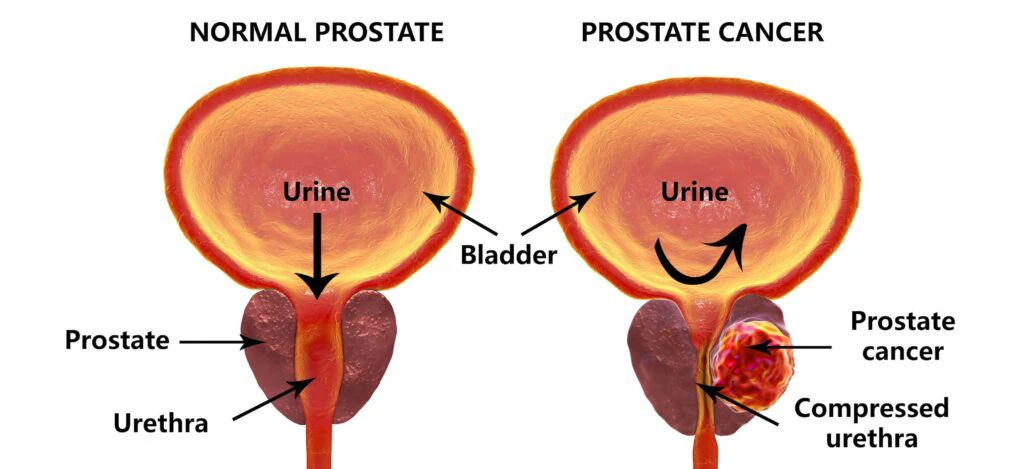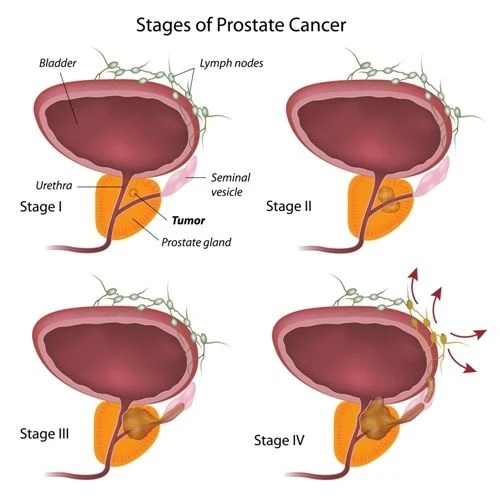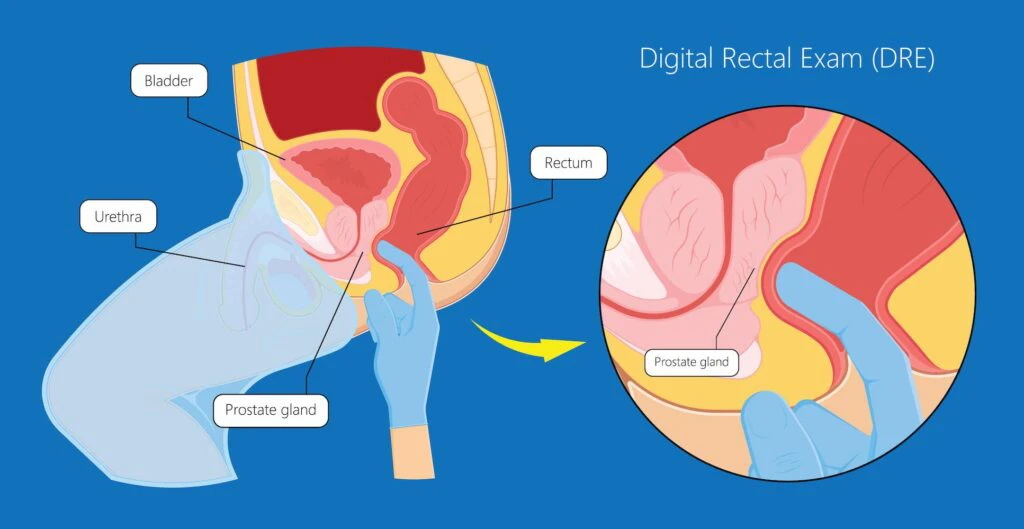According to the National Cancer Centre Singapore, prostate cancer ranks as the top most frequently diagnosed cancer among men in Singapore.
The risk of developing prostate cancer increases with age, particularly in men over 50 years. Although the risks increase as men grow older, prostate cancer remains treatable, especially when it is detected early. Many patients can achieve favourable outcomes and a full recovery through timely diagnosis and appropriate treatment.
Knowing the stages of prostate cancer development provides valuable information for patients to better understand the progression of their disease. In this guide, Dr Terence Lim, a Senior Consultant Urologist from Singapore with a subspecialty in Uro-Oncology, offers an overview of prostate cancer stages.

Prostate cancer is a type of cancer that originates in the prostate gland, a walnut-sized organ in the male reproductive system that is located just below the urinary bladder and in front of the rectum.
The main function of the prostate gland is to produce semen, which nourishes and transports sperm. Prostate cancer occurs when an uncontrolled proliferation of abnormal cells is present, causing the growth of malignant tumours. Initially, prostate cancer develops slowly in the prostate gland. However, some types of prostate cancer can be more aggressive and may spread to other parts of the body, making early detection and staging critical.
According to the Singapore Cancer Society, prostate cancer is likely to affect roughly 1 in 25 Singaporean men during their lifetime. Risk factors for prostate cancer include advanced age (over 50 years of age), family history of the disease, and certain genetic mutations. Lifestyle choices, such as a diet high in animal fat but low in fibre, smoking and exposure to cadmium, can also lead to elevated prostate cancer risk.
The Staging System Explained
Cancer staging is an important aspect of the diagnostic and treatment planning process for prostate cancer. Staging helps urologists determine the size, location, and spread of the cancer. This information is then used to create effective and individualised treatment plans according to each patient’s condition.
One of the most commonly used methods for staging prostate cancer is the tumour, node and metastasis (TNM) system, which evaluates three important factors:
Tumour describes the size and extent of the tumour in/around the prostate.
Node assesses whether cancer has spread to nearby lymph nodes.
Metastasis determines if the cancer has spread to other parts of the body, such as the bones, other organs, or distant lymph nodes.
The Stages of Prostate Cancer

Stage I: Localised Prostate Cancer
Stage I prostate cancer is characterised by a small tumour that is located in the prostate gland. At this early stage, patients may not show noticeable symptoms, as localised prostate cancer is usually asymptomatic.
Treatment options for Stage I include active surveillance, radiation therapy, or surgery. Patients may receive different treatments depending on their age, overall health, cancer grade or characteristics and personal preferences. With early intervention, the prognosis for Stage I prostate cancer is excellent most of the time, with high survival rates and potential for complete recovery.
Stage II: Locally Advanced Prostate Cancer
Stage II prostate cancer involves a larger tumour that is still located within the prostate gland but may occupy more of the gland compared to Stage I. Symptoms may still be minimal. However, some patients may start experiencing urinary changes or discomfort in the pelvic area.
Treatment options for Stage II typically involve a combination of therapies, including radiation, surgery, and hormone therapy. These treatments will work together to target the cancer within the gland. The prognosis for Stage II is generally positive, especially with early and comprehensive treatment. However, the outcome may depend on individual factors, such as tumour characteristics and the patient’s overall health.
Stage III: Advanced Prostate Cancer
Stage III indicates that the tumour has spread beyond the prostate to nearby tissues like seminal vesicles but has not reached distant organs. Symptoms may become more apparent at this stage, with possibilities of urinary difficulties, pelvic pain, or blood in the urine.
Treatment for Stage III often includes radiation therapy with hormone therapy or surgery. These treatments are selected based on the patient’s specific needs and health status. The goal of the treatment is to control the spread of cancer, manage symptoms, and improve quality of life. Stage III can be challenging, but it can still be managed effectively with an effective treatment plan.
Stage IV: Metastatic Prostate Cancer
Stage IV prostate cancer signifies that cancer has spread to distant parts of the body, including the bones, lymph nodes, or other organs. At this stage, patients may experience bone pain, fatigue, weight loss, and worsening urinary symptoms.
Treatment plans for Stage IV prostate cancer focus on managing symptoms, slowing the progression of the cancer, and enhancing the patient’s quality of life. Palliative care options, including chemotherapy, hormone therapy, and targeted treatments, are often employed to alleviate pain and reduce the cancer’s impact on a patient’s daily life.
Pentingnya Deteksi Dini

Detecting prostate cancer early is crucial because it can significantly improve treatment outcomes. Screening methods, such as the prostate-specific antigen (PSA) test and digital rectal exams (DRE), are commonly used to identify prostate cancer in its initial stages, usually before symptoms start to develop.
Early detection through regular screenings enables immediate intervention, potentially preventing the cancer from progressing to more advanced stages.
If indicated, your urologist may suggest that you undergo a Prostate-Specific Antigen (PSA) test and a digital rectal exam (DRE). Men with a higher risk of prostate cancer, such as people with a family history of prostate cancer or those aged 50 or older, may choose to have prostate cancer penyaringan despite having no symptoms. This is because, due to the asymptomatic nature of early-stage prostate cancer, feeling perfectly well does not guarantee the absence of the disease.
Prostate Cancer Screening in Singapore
At Assure Urology and Robotic Centre, a urology specialist clinic in Singapore’s Mount Elizabeth Hospital (Orchard), we prioritise your prostate health and deliver expert care. Specialising in minimally invasive robotic prostate surgery, our clinic leverages robotic technology to offer enhanced visualisation and accuracy, enabling accurate detection of prostate abnormalities. Should any conditions be identified, our skilled urologist will work with you to address the root cause. Take control of your prostate health today for peace of mind.
Dealing with Prostate Cancer in Singapore
Receiving a diagnosis of prostate cancer can have a profound emotional and psychological impact on patients and their families. Patients may join counselling and support groups which are available to help individuals navigate the challenges associated with a cancer diagnosis. In Singapore, organisations like the Singapore Cancer Society provide patients with access to counselling and community support programmes. These programmes may empower patients and their families with emotional support to cope with the demands of treatment and recovery progress.
Creating small changes in patient’s lifestyles can also play a supportive role in their overall well-being, like adopting a balanced diet, engaging in regular exercise, and managing stress levels.
It is essential for patients to commit to ongoing specialist care, which includes monitoring and managing the cancer. Regular follow-ups enable urologists to track treatment effectiveness, manage side effects, and make any necessary adjustments to the treatment plan.
Kunjungi Assure Urology & Robotic Center
If you or a loved one are concerned about prostate cancer, book a consultation with Assure Urology’s Medical Director and Senior Urologist, Dr Terence Lim, for personalised guidance and screening options. Not only does Dr Lim have a subspeciality in uro-oncology (urological cancers), but he also served as Chief of the Department of Urology at Changi General Hospital (CGH) before his private practice. Therefore, our experienced team can help you find the answer to your concerns regarding prostate cancer. Assure Urology & Robotic Centre is conveniently located at Singapore’s Mount Elizabeth Hospital (Orchard).


